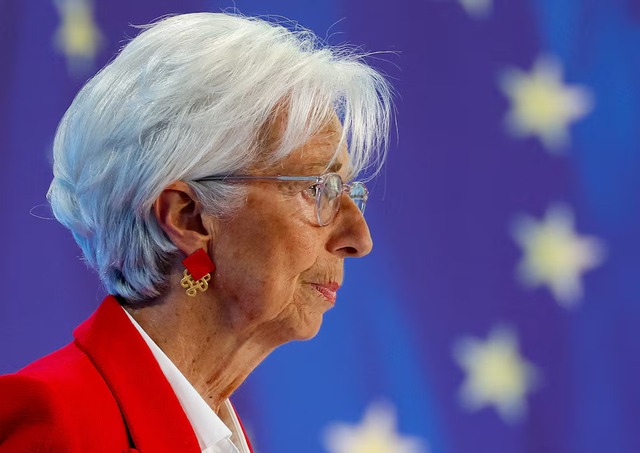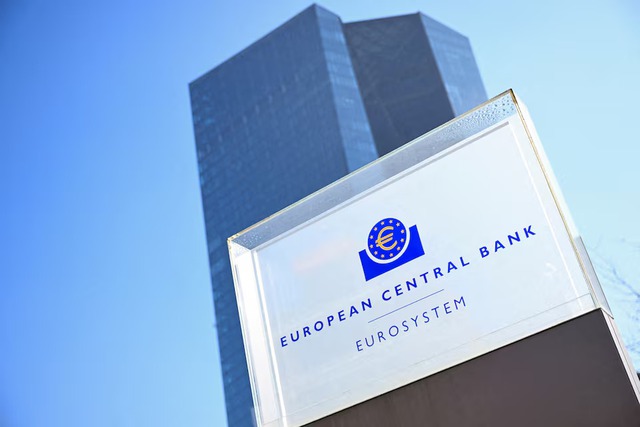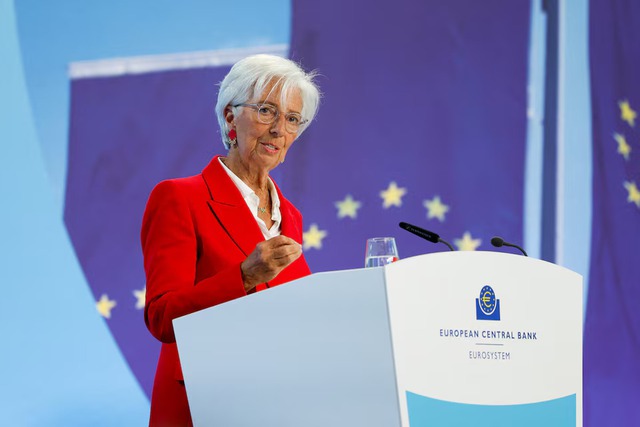
ECB to keep rates steady as trade conflict clouds economic outlook
FRANKFURT -- The European Central Bank was set to keep interest rates on hold on Thursday, pausing after seven straight cuts as it waited for the fog surrounding Europe's trade relations with the United States to clear.

European Central Bank (ECB) President Christine Lagarde addresses the media after the ECB's Governing Council meeting, at the ECB headquarters in Frankfurt, Germany, June 5, 2025. Photo: Reuters
The ECB has halved its policy rate from 4% to 2% in the space of just one year after taming a surge in prices that followed the end of the COVID-19 pandemic and Russia's attack on Ukraine.
With inflation now back at its 2% goal and expected to stay there, euro zone central bankers were likely to stay put this week and observe what kind of tariffs President Donald Trump's U.S. administration would impose on the European Union after an August 1 deadline for talks, all 84 economists polled by Reuters said.
The tense and unpredictable trade talks between Washington and Brussels have made policy-making difficult.
Trump's threat to impose a 30% duty on EU goods exported to the U.S. - a steeper tariff than the ECB had anticipated under even the most negative of three scenarios it released last month - has forced ECB President Christine Lagarde and her colleagues on the Governing Council to contemplate lower outcomes for growth and inflation.

A view of the European Central Bank (ECB) headquarters in Frankfurt, Germany, March 6, 2025. Photo: Reuters
However, two diplomats said on Wednesday the EU and the U.S. were heading towards a deal that would result in a broad tariff of 15% applying to EU goods, an outcome lying closer to the ECB's baseline scenario than the severe possibility.
"If the two sides indeed conclude such a deal, it would support our call that the euro zone economy can regain momentum from the fourth quarter onwards and that the ECB will not need to cut rates further," Berenberg economist Holger Schmieding said.
Among the deals that have been struck so far and could serve as a template for the EU, Japan negotiated a 15% tariff rate, Indonesia 20% and Britain, which runs a trade deficit with the United States, 10%.
"The key point is that tariffs look likely to be higher and more varied across countries than the 10% flat baseline that many had assumed would be the end-point of tariff negotiations," BNP Paribas's head of developed markets economics Paul Hollingsworth said.
The ECB assumes that U.S. tariffs will push down growth and, if there is no EU retaliation, inflation over the medium term.
This is why markets and most economists are still betting on at least one more interest rate cut, probably towards the end of the year, as inflation is now at risk of going too low.
The euro zone economy is already barely growing and companies, while still optimistic about an upturn ahead, are starting to feel the pinch from tariffs on their profits.
Even the ECB's own projections see price growth dipping below 2% for the next 18 months, raising the prospect of undershooting.
"More challenging may be the end of the year, when we see inflation dropping below 1.5% and staying thereabouts for most of 2026," Societe Generale's Anatoli Annenkov said.
"Here we see risks that inflation expectations follow inflation lower, forcing the ECB to take action to anchor inflation expectations."

European Central Bank (ECB) President Christine Lagarde addresses the media after the ECB's Governing Council meeting, at the ECB headquarters in Frankfurt, Germany, June 5, 2025. Photo: Reuters
On the other hand, banks have seen rising loan demand and policy uncertainty has not yet translated into an economic or market downturn.
After a short-lived selloff in April investors have taken the trade turmoil in their stride, with European equity indices close to new highs also thanks to Germany's newly found appetite for spending.
In fact, erratic policy-making in the United States, including Trump's relentless criticism of the Federal Reserve, has lured foreign investors to euro zone assets, briefly pushing the euro to the highest level against the dollar since September 2021 at $1.1829 earlier this month.
ECB board member and outspoken hawk Isabel Schnabel even said the central bank should watch out for price hikes caused by tariffs and the bar for further cuts was "very high".
But the euro's appreciation has unnerved other policymakers, who fear a stronger currency would make European exports less competitive and contribute to pushing down inflation.
"On that front, we would expect Christine Lagarde to strike a reassuring tone, reminding people that the ECB does not target exchange rates but that any resulting downward pressure on inflation will be addressed, if necessary," Julien Lafargue, chief market strategist at Barclays Private Bank, said.
Reuters
Link nội dung: https://news.tuoitre.vn/ecb-to-keep-rates-steady-as-trade-conflict-clouds-economic-outlook-103250724144337532.htm
